Search
for
Sort by
Research
60-90 / 1000+ results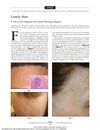
research Lonely Hair
Isolated long hairs at the original hairline can help diagnose Frontal Fibrosing Alopecia.
research The Value of Dermoscopy in Diagnosing Eyebrow Loss in Patients with Alopecia Areata and Frontal Fibrosing Alopecia
Trichoscopy effectively diagnoses eyebrow loss, distinguishing between alopecia areata and frontal fibrosing alopecia.

research Further Research Needed If Finasteride Is to Become Standard of Care for Frontal Fibrosing Alopecia
More research needed to confirm finasteride as standard treatment for FFA.

research Frontal Fibrosing Alopecia: A Disease That Remains Enigmatic
Frontal fibrosing alopecia is a poorly understood condition with increasing cases and unclear treatment effectiveness.

research Frontal Fibrosing Alopecia and Lichen Planus Pigmentosus: Diagnosis and Therapeutic Challenge
Managing frontal fibrosing alopecia and lichen planus pigmentosus is challenging due to resistant hair loss and skin discoloration.

research Isolated Body Hair Loss: An Unusual Presentation of Lichen Planopilaris
A man with rare Lichen Planopilaris lost body hair, not scalp hair, and treatment stopped itching but didn't regrow hair.

research Frontal Fibrosing Alopecia Under Dynamic Optical Coherence Tomography
D-OCT shows increased blood vessel growth in response to tissue damage in Frontal Fibrosing Alopecia and is useful for diagnosis and monitoring.

research Thermal Imaging and Trichoscopy for Detecting Inflammation in Frontal Fibrosing Alopecia
Thermal imaging is a useful non-invasive method to diagnose active inflammation in frontal fibrosing alopecia.

research Frontal Fibrosing Alopecia: Treatment with Oral Dutasteride and Topical Pimecrolimus
Oral dutasteride and topical pimecrolimus can safely and effectively treat Frontal Fibrosing Alopecia, leading to significant hair regrowth.
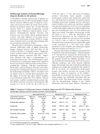
research Trichoscopic Features of Frontal Fibrosing Alopecia: Results in 249 Patients
Trichoscopy helps diagnose and assess the severity of Frontal Fibrosing Alopecia.

research Medical Therapy for Frontal Fibrosing Alopecia: A Review and Clinical Approach
Some treatments like intralesional steroids and 5α-reductase inhibitors are effective for frontal fibrosing alopecia, but more research is needed.
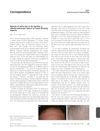
research Absence of Vellus Hair in the Hairline: A Videodermatoscopic Feature of Frontal Fibrosing Alopecia
Lack of small, fine hair on the front hairline is a key sign of frontal fibrosing alopecia.

research Frontal Fibrosing Alopecia: A Review
Frontal Fibrosing Alopecia's cause is unclear, affects mainly postmenopausal women, and current treatments focus on stopping hair loss rather than regrowth.

research Diagnostic and Therapeutic Assessment of Frontal Fibrosing Alopecia
The document concludes that there are no reliable treatments for frontal fibrosing alopecia, with only temporary benefits from current options.

research Familial Frontal Fibrosing Alopecia: A Cross-Sectional Study of 20 Cases from Nine Families
Frontal fibrosing alopecia in families shows similar signs to individual cases and may have a genetic link.

research Study of Human Leukocyte Antigen in 13 Cases of Familial Frontal Fibrosing Alopecia: CYP21A2 Gene p.V281L Mutation from Congenital Adrenal Hyperplasia Linked to HLA Class I Haplotype HLA-A*33:01; B*14:02; C*08:02 as a Genetic Marker
A genetic marker linked to a type of hair loss was found in most patients studied.

research Hair Transplantation for Frontal Fibrosing Alopecia: Part of the Solution?
Hair transplantation for Frontal Fibrosing Alopecia may work if done after the disease is inactive for 2 years and with ongoing treatment after surgery.

research Reassessing Frontal Fibrosing Alopecia
Frontal Fibrosing Alopecia is a slowly progressing hair loss condition, likely underdiagnosed, with ineffective treatments, needing more research to understand it fully.

research Hair Transplantation for Frontal Fibrosing Alopecia: Part of the Solution?
Hair transplantation for Frontal Fibrosing Alopecia may work if the disease is inactive for 2 years and with ongoing treatment to maintain results.

research Frontal Fibrosing Alopecia: A Review of 60 Cases
Mostly postmenopausal Caucasian women get Frontal Fibrosing Alopecia, which often includes eyebrow loss and has limited treatment success.

research Frontal Fibrosing Alopecia: A Retrospective Clinical Review of 62 Patients with Treatment Outcome and Long-Term Follow-Up
The treatment helped reduce symptoms and stabilize the hairline in most patients with Frontal Fibrosing Alopecia, but hair regrowth was limited.

research Lichen Planopilaris and Frontal Fibrosing Alopecia as Model Epithelial Stem Cell Diseases
Lichen Planopilaris and Frontal Fibrosing Alopecia may help us understand hair follicle stem cell disorders and suggest new treatments.

research Frontal Fibrosing Alopecia: An Update on Pathogenesis, Diagnosis, and Treatment
The cause of Frontal Fibrosing Alopecia is unclear, diagnosis involves clinical evaluation and various treatments exist, but their effectiveness is uncertain.

research Frontal Fibrosing Alopecia Among Men: A Clinicopathologic Study of 7 Cases
Men with Frontal fibrosing alopecia typically lose hair on the front scalp and sometimes on sideburns and upper lip, with treatments showing varied success.
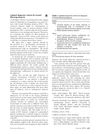
research Updated Diagnostic Criteria for Frontal Fibrosing Alopecia
New criteria for diagnosing frontal fibrosing alopecia include specific scalp and eyebrow hair loss as major factors and other hair loss areas and hair analysis as minor factors.

research Frontal Fibrosing Alopecia: To Treat or Not to Treat?
Treatments for Frontal Fibrosing Alopecia have not been proven effective.

research Frontal Fibrosing Alopecia: A Case Series of 65 Patients Seen in a Single Italian Centre
The study concluded that severity of Frontal fibrosing alopecia is not linked to how long someone has it, can start before menopause, and eyebrow loss may be an early sign.

research Guidelines for Clinical Trials of Frontal Fibrosing Alopecia: Consensus Recommendations from the International FFA Cooperative Group
Experts agreed on guidelines to improve research on Frontal Fibrosing Alopecia.
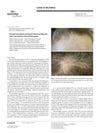
research Clinical Description of Frontal Fibrosing Alopecia with Concomitant Lichen Planopilaris
Some women with Frontal Fibrosing Alopecia also have Lichen Planopilaris, which can lead to more symptoms and affect hair outside the scalp.